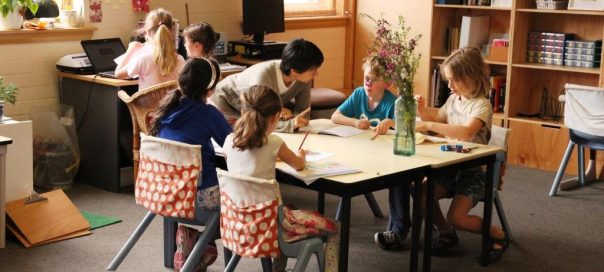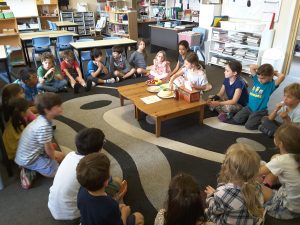
How to help children navigate appropriate social behaviour at an age when they are experimenting with boundaries.
By Elise Hawthorne
Every parent worries about conflict within the school environment; it is a topic discussed widely in the media and cannot be ignored which may have been the case with past generations when children were encouraged to “toughen up” when faced with dealing with conflict.
Enlightened teaching practises such as the Montessori philosophy of education takes a more proactive and child centred approach when dealing with this important topic.
Bill Conway, Principal of Montessori East Primary & Pre School talked me through dealing with conflict from a Montessori teaching perspective. Bill believes that, “children going through a period of their lives where they are experimenting, school becomes a laboratory so to speak, a social playground. In that space they need to check the boundaries of what works; what is acceptable behaviour and what isn’t and why. Importantly in that process, children need to come to their own conclusions.”
From a Montessori teacher’s point of view, when dealing with conflict in the classroom, punishing a child for anti social behaviour is not necessarily the way to go as it stymies learning for all and the opportunity to build resilience and empathy for others.
Montessori teachers put a lot of thought into why children behave a certain way.
Bullying and other anti-social types of behaviour, and the other extreme, a child being overly kind presents in the classroom at various times in various ways. Montessori teachers believe that children are navigating a social minefield, figuring out what works for them and what doesn’t. The Montessori approach to education believes that teachers (and parents) need to be aware of a child’s personality type and what is happening in a child’s home environment – basically what is influencing a child’s behaviour?
For example – is it a competitive environment at home, is it an environment where the child is continualy seeking out approval from his or her parents for whatever reason. These pressures socialise children in ways that present behaviours that are anti-social in the classroom and playground context.
A child’s hierarchal situation at home is brought into play – does a child have dominating sibling or parents – if this is the case, at school the child might want to react to that by becoming dominating in the playground. Basically there is more than meets the eye when deconstructing a child’s behaviour and Montessori teachers scratch the surface and indeed analyse carefully a child’s reason for exhibiting certain behaviours.
In a Montessori classroom the teacher creates a classroom environment where there are no signs of power play. The teacher is in charge but his or her role isn’t a dominant one; it is a true partnership with the children.
As Bill Conway suggests, “the elimination of a hierarchy is fundamental in the Montessori environment. Empowering of the child which comes with their right to make choices in their self learning journey naturally eliminates the need for a child to be overpowering when interacting with their peers.
Montessori children are given choices; driving their own behavioural choices is an empowering aspect in itself.”
The Montessori classroom strives to be a safe environment – one where older children mentor younger children and leadership is all about helping.
Montessori East children are given tools to help them navigate appropriate social behaviour. Self education starts early with grace & courtesy lessons, which happen in younger grades at Montessori East.
The importance of virtues are taught weekly. Children are given lessons about valuing respect, perseverance, patience and courtesy. Children can ask, how do I practise that? What does that look for me – how does it work or not work? This guides a child’s own behaviour enabling them to make decisions right for themselves and the class and indeed the school as a whole.
Bill Conway points out that, “accountability is what we want to teach so that children are able to self measure their social behaviour based on learnt virtues.”
Montessori East teachers’ unify a child’s focus believing it needs to be incorporated as part of the school culture with families, kids and teachers all involved. Show by example is an old saying but nevertheless practised daily at Montessori East.
Bill Conway believes that, “the adult has to have the same qualities as you would like to see developed in a child, honouring the child’s and their own dignity in all interactions. Dr Maria Montessori’s focus on the child rather than on the teacher assists to raise the dignity of the child.”
Focusing on the child, teacher’s at Montessori East ask themselves, what’s going on developmentally for the children in relation to their social and emotional maturity? Montessori educators know that children focus on being social intensifies around the ages of nine and ten which includes their feeling of security coming from their relationships with their peers.
Montessori teachers acknowledge that at around the age of 11 children have a need for independence, to have a level of control over their lives. Montessori educators do not interpret this as students rejecting authority or going astray, they interpret it as a development stage – this is sadly not the case in all educational environments. Bill Conway believes that this type of behaviour in children is, “all a part of their nature development and our response to it is most important.”
When Bill was asked the question, what approach do you believe is important in supporting a child’s growth and resolving conflicts in the classroom? his response was both enlightening and encouraging at the same time – “children need to be heard, teachers should guide their social development rather than impose on them. The more kids can resolve their own conflicts with taught skills the more likely a conflict situation will be dealt with in a positive way.”
For example in a Montessori classroom children are encouraged to try and work conflict out via talking honestly and in a positive way to each other, by teachers refraining from providing an immediate solution, children are encouraged to use their own skills to resolve conflict.
Some classrooms have a peace corner rather than a naughty corner where children have the privacy to speak to each other about interpersonal issues. Books focusing on the topic of peace are available so that children are shown positive ways of dealing with conflict by example in a non threatening way. “Of course more guidance is offered if needed but children do need to go through the process of learning independently no matter what the topic”, said Bill.
Children are given the right to choose how to deal with a situation, they are encouraged to choose a positive way forward by the valuable life lessons they are continually taught at Montessori East.
Bill outlines how a challenging child who had violent outbursts would be dealt with at his school, “children come up with positive solutions, they show kindness rather than engage in conflict. We at Montessori East believe that, “if you give children credit for understanding their own and others behaviour they will be empowered to come up with their own solutions when dealing with conflict or bullying in any form. It’s a case of trusting and enabling them to make decisions, to resolve issues.”
A Montessori classroom is a real partnership between teacher and students where children work to define the classroom rules and peer group leadership is encouraged in multi-age classroom groups. It is the exact opposite of the classroom Noam Chomsky is describing when he reflects on mainstream education, “the school system is designed to teach obedience and conformity and prevent the child’s natural capacities for developing.”
As Dr Maria Montessori so wisely said, “the child is both a hope and a promise for mankind.”
For more information go to: www.montessori.nsw.edu.au







Get Social